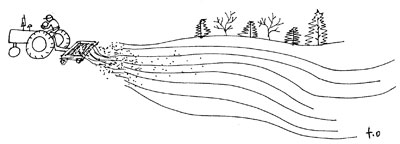 |
 |
 |
 |
| Toki Oshima drawings |
After several months of investigation and discussion at the request of many members, MOFGA’s Public Policy Committee has developed a revised policy on sludge, which was approved by the Board of Directors on October 19, 2003. MOFGA’s previous policy, incorporated in its certification standards, banned the use of sludge on certified crop land but did not address the issue of application of sludge to land generally. The revised policy, printed below, is intended to carefully balance this organization’s deep commitment to recycling organic materials, with an understanding of the risks of persistent toxics that may contaminate sludge as a result of discharges by industries as well as careless homeowners. Under the National Organic Standards, certified crops may not be grown with sludge, and land must be free of sludge applications for a minimum of three years before it can be used in organic production. MOFGA’s revised policy is focused on the potential problem of persistent and bioaccumulative toxics in some sludge spread on noncertified land in Maine, because we want to be sure that future Maine crop land converted to organic production will be suitable and safe for organic cultivation.
MOFGA Sludge Policy (Approved 10/19/03)
Conserving and recycling nutrients is at the heart of organic agriculture. Sewage and other sludge materials contain many nutrients that have been captured from a waste stream, as well as organic matter that would increase soil tilth. In principle, the Maine Organic Farmers and Gardeners Association strongly supports recycling these materials. However, sludge potentially contains hundreds of items of concern from environmental and food safety vantages. A 2002 Report by the Board of Environmental Studies and Toxicology of the National Academy of Sciences underscored the uncertainties about the potential for adverse human health effects from exposure to biosolids and identified several data gaps and issues in management practices that should be addressed regarding land application of sludge.
Under the National Organic Standards, certified crops may not be grown with sludge, and land must be free of sludge applications for a minimum of three years before it can be used in organic production.
The Maine Organic Farmers and Gardeners Association supports more public education, more research and more effective regulation to eliminate chemical contaminants that persist or bioaccumulate in the environment from sludge. To that end, it supports (a) prohibiting land application of sludge that contains persistent or bioaccumulative toxics that may contaminate the food chain or other ecological systems; (b) stricter, more frequent testing of sludge destined for land application and of the land following sludge application; (c) adhering to the precautionary principle in setting standards for sludge contaminants; (d) allowing municipalities to enact ordinances that are more stringent than state regulations; and (e) developing a system to enable land purchasers to easily determine any history of sludge application to their land.
For more information on sludge issues, see the Sept.-Nov. 2003 issue of The MOF&G, “Sludge by Any Name Will Never Be Organic,” by Sue Smith-Heavenrich; Maine Sludge Alliance; www.maine.gov/dep/ (Maine Department of Environmental Protection Guidance on Regulation of Septage and Sludge Land Application by Municipalities); and www.sierraclub.org/policy/conservation/solidwaste.asp (Sierra Club policy on Land Application of Sludge).
